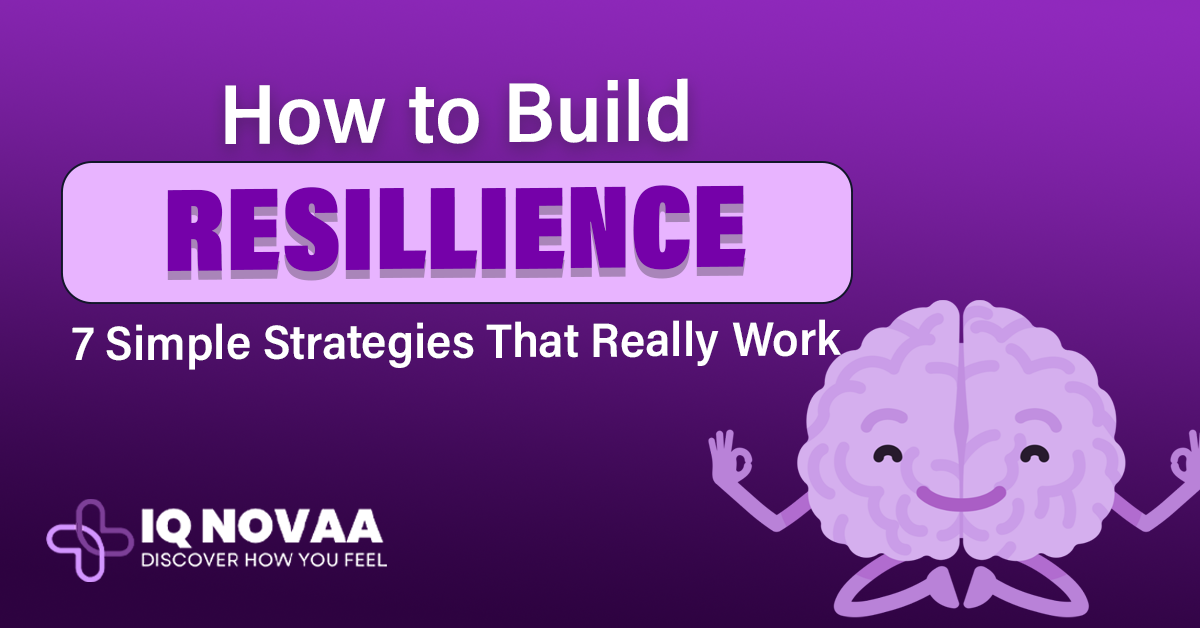Life often brings stress, pressure, and unexpected challenges. Learning how to build resilience helps you stay calm and strong when things do not go as planned. In 2025, stress levels are still rising worldwide. A new report by the American Psychological Association found that more than 45% of adults feel they are not handling stress well. This shows how important it is to work on resilience every day.
Building resilience does not mean avoiding problems. It means facing them with a positive mindset and learning how to recover faster. By adding small daily habits and simple strategies, anyone can improve emotional resilience and bounce back from stress more easily.
This article shares seven practical strategies that actually work in real life. These tips are simple, natural, and easy to follow for a stronger and calmer mind.

Why Learning How to Build Resilience Matters in Everyday Life
Resilience is the inner strength that helps you adapt and keep going when life gets tough. People who build resilience usually have better emotional balance, more confidence, and stronger relationships.
For example, Lisa, a teacher, faced a sudden change at work. Instead of feeling defeated, she practiced deep breathing and focused on what she could control. Within weeks, she felt calmer and more focused.
Recent studies show that people with strong resilience experience 25% less burnout at work and handle stress better than others. Learning how to build resilience truly helps you grow in every area of life, from personal challenges to career success.
Resilience Strategies for Life You Can Start Today
These seven simple steps are proven resilience strategies for life. You can start small and build them into your routine gradually.
1. Practice Positive Self-Talk
Your thoughts shape how you feel. Replace negative thinking with supportive and kind words. Instead of saying “I can’t do this,” try “I can learn from this.”
For example, Raj, who struggled with anxiety during exams, started using short affirmations like “I’m doing my best.” Over time, he noticed more focus and less worry.
Quick Tip: Write one positive sentence about yourself every morning to begin your day with strength.
2. Maintain a Support Network
Having people you can trust makes it easier to stay mentally strong. Family, friends, or support groups can help you talk through problems and see things clearly.
For more daily wellness habits, visit our guide “10 Daily Habits That Work.”
3. Set Realistic Goals and Take Action
Breaking big goals into smaller, clear steps gives you a sense of progress and control. Each small win increases your confidence.
Carlos wanted to change careers but felt scared. He started by taking one short online course. Within months, he gained new skills and the courage to move forward.
4. Embrace Adaptability
Life does not always go the way we plan. Learning to adapt keeps you flexible and less stressed.
When Amir’s project deadline changed, he adjusted his schedule and used the extra time to improve his work. By staying calm, he completed everything smoothly.
5. Prioritize Self-Care Practices
Taking care of your body and mind builds long-term strength. Good sleep, healthy food, and exercise are simple ways to stay balanced.Learn more at Mayo Clinic: Benefits of Self-Care

6. Develop Problem-Solving Skills
When faced with problems, try writing down possible solutions. This helps you focus on actions instead of fear.
Sara faced a financial issue and wrote three ways to manage her expenses. By choosing one plan and following it, she felt more confident and calm.
Action Step: List three possible solutions to your current challenge. This small step builds resilience naturally.
7. Reflect and Learn from Setbacks
Failures are not the end. They are lessons that help you grow stronger.
Ways to Stay Mentally Strong Every Day
To stay mentally strong, you need regular habits that calm your mind and refresh your energy.
Morning Gratitude: Write one thing you are thankful for. It helps shift your focus from stress to positivity.
Evening Reflection: Spend a few minutes thinking about what went well today.
Short Breaks: Take five minutes outdoors or stretch during long work hours.
Limit Negative News: Too much bad news can increase anxiety. Focus on what uplifts you.
Connect with Loved Ones: Sharing thoughts with family or friends helps reduce pressure and builds emotional safety.
These small daily actions protect your mental energy and keep you strong even when life feels heavy.
Simple Habits to Improve Emotional Resilience
You can improve emotional resilience by making small, healthy choices that support your well-being.
- Sleep well: Aim for 7 to 8 hours. A 2025 health report showed that people who sleep properly recover from stress 30% faster.
- Exercise regularly: Physical activity improves your mood and focus.
- Eat balanced meals: Nutrients like omega-3 and vitamin B reduce anxiety and fatigue.
- Practice mindfulness: Short breathing or meditation sessions calm your thoughts.
- Write your feelings: Journaling helps release emotions and clears your mind.
When you do these regularly, you will notice that stress affects you less and you bounce back quicker.
How to Bounce Back from Stress and Stay Positive
Bouncing back from stress means learning, growing, and not letting hard times define you. Everyone faces setbacks, but what matters is how you respond.
Take one step at a time, focus on what you can control, and be kind to yourself during recovery. Remember, resilience is built slowly through patience and self-belief.
For example, Fatima lost a major client in her small business. Instead of giving up, she reflected, improved her service, and gained new clients within months.
Stay patient, keep learning, and know that every challenge adds to your inner strength.
FAQs About Building Resilience
What is the simplest way to build resilience?
Start small. Practice positive self-talk or gratitude journaling daily. These tiny steps build emotional strength.
How long does it take to improve emotional resilience?
It depends on consistency. Many people notice positive changes within four to six weeks.
Can social connections really impact resilience?
Yes. Supportive relationships lower stress and help you bounce back from challenges faster.
How can I stay mentally strong during setbacks?
Take breaks, reflect on lessons, and remind yourself of past successes.
Are there specific exercises that improve resilience?
Yoga, walking, mindfulness, and aerobic activities help both your body and mind stay balanced.
Can resilience help in professional life?
Absolutely. Resilient people make decisions calmly, adapt quickly, and stay productive under stress.
How do I know if my resilience is improving?
You’ll feel calmer, recover from setbacks faster, and worry less about future problems.
Does diet affect resilience?
Yes. A healthy diet supports brain function, energy levels, and overall emotional health.
Final Thoughts
Building resilience is an ongoing journey. Start with one habit today — maybe gratitude, exercise, or journaling. Small daily actions will make you stronger, calmer, and better prepared for whatever comes next.

